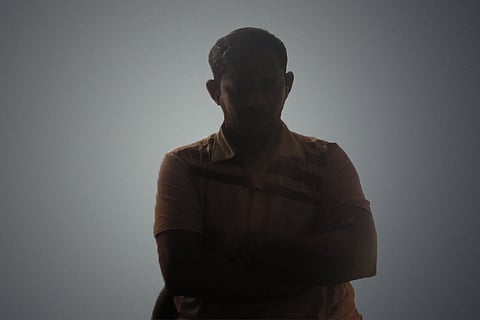

What do you do when your worst fear comes true?
For the father of Hasini, a seven-year-old who was sexually assaulted, murdered and burnt in Chennai, this nightmare came to life on Tuesday. The accused in his daughter's case was granted bail by a Mahila Court in Chengalpet. This was after the Madras High Court quashed 22-year-old Dhasvanth’s detention under the Goondas act. He was arrested in February for the little girl’s rape and murder.
"My first instinct was to make sure my wife did not hear about this," says 36-year-old *Rajesh, who was at his native village in Andhra Pradesh when he heard the devastating news. "I told her my phone is broken and needed hers for two days. I couldn't sleep the whole night. I am just in shock. How can they let him go like this?" he asks, tensed.
Dhasvanth, who resided in the same apartment complex as Rajesh's family in Mugalivakkam had allegedly lured the child into his apartment, sexually assaulted and murdered her. He then went on to burn the little girl’s body. Neighbours had alleged that the mechanical engineer had brought a puppy home about five months back and used that to get close to the children in the flat.
On March 20, even as investigations were underway, police slapped the Goondas act against him. Dhasvanth's father had applied for his bail in a Mahila Court in Chengalpet even before the he was booked under the Goondas Act.
Dhasvanth’s father had then filed a habeas corpus petition in front of the Madras High Court. The court on Tuesday accused the police of not responding to the petition filed by the father on time and of delaying the case. It further added that this was against the rights of the petitioner. Thus, Dhasvanth’s detention under Goondas Act was set aside.
“I was surprised when he got bail, I never thought he would. Senior police officers had promised me that he won't get bail for a year as they had invoked the Goondas Act on him, Rajesh told TNM.
The distraught father, who reached Chennai on Wednesday night, insists that in spite of the setbck, he holds on to his belief in the justice system.
“What is the message that the High Court is giving? Many people told me not to pursue a legal battle, but I believed in justice. I am unable to answer all those people who never trusted the legal system. The message from the court is that we can murder, we can do anything, but we can get bail. Even now I believe in the system. I will fight, my child won't come back,“ he said.
"He is a hardened criminal and clearly letting him out like this is a danger to the society. What if he does something to other children? The court has to think about this case from a humanitarian point of view. A threat to society has been unleashed on the order of the courts," says Rajesh, alarmed.
The interview.
Sherin working with Nakshatra NGO, who has been helping the father says that it is a collective failure, and one cannot single out the police and judiciary. "It takes weeks for a post mortem report, five months for the DNA report to come. How will things proceed smoothly then. He is out on bail, we can't do much. But we want a swift trial," she said.
In an interview to TNM in August, this father had said that he would kill the accused himself but that he believed in the system.
"The court was doing its duty but now, they have failed to protect people. Isn't that the primary responsibility? So many others will feel emboldened by this bail order," he warns now.
While Rajesh was convinced until now about sticking with the case, despite many people telling him to drop it, he seems quite dejected now. This bail order is perhaps the biggest blow to Rajesh's fight for justice in the last seven months.
"Now, I will seek an appointment with the Chennai Commissioner and ask him what can be done. If the system fails us, we don't have a choice but to get out of it," he says.
TNM, as part of its ethical standards, does not share names of victims of sexual assault. In this case, as the victim is no more, and in the interest of justice, we have received written permission from her father to name Hasini.